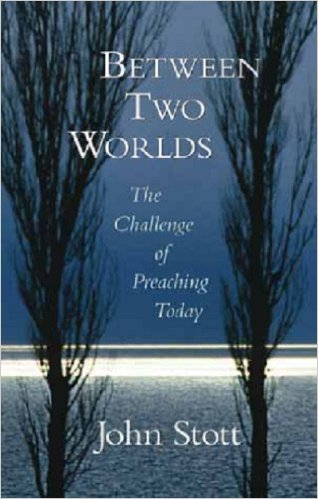Introduction
John Stott has written what has been deemed a modern classic entitled Between Two Worlds. Stott was a world-renowned preacher and evangelist. He was rector emeritus of All Souls Church, Langham Place, London, and founder of the London Institute for Contemporary Christianity. He has written numerous works and commentaries, some of his titles include, The Cross of Christ, Your Mind Matters, and The Radical Disciple. He went to be with the Lord in 2011.
Summary
This book seeks to address the challenge of preaching today. The title reveals that the task of preaching is to bridge the two worlds of God’s word and human life. The preacher finds himself between these two worlds and he must not neglect one for the other. There is an excellent balance held in these pages as the world of God’s word is honored and yet the world of human life is esteemed as well. The complications of contemporary life and preaching come to a head in this work and a clear biblical path is cut for the preacher to walk.
The book divides nicely into eight chapters dealing with different angles on the subject of preaching in the contemporary world. To begin a historical sketch of preaching is put forth as a foundation for the reader. This history spans from Christ and the apostles all the way to preachers in the twentieth century. This first chapter serves to show the necessity of preaching to Christianity. It also reveals a consistent perspective of Christian preachers throughout the ages. Though the context and culture change there is an unchanging heartbeat possessed by preachers.
The second chapter presents the modern objections to the task of preaching. In this chapter three modern complications are presented to the usefulness of preaching and wise responses to these complications follow. The first objection to preaching is that our culture possesses an anti-authority mood. Though all ages have rebelled against authority ours seems to succeed all others. The preacher must remember human depravity, the need for revelation, and that the word has authority not himself. The next objection to preaching is that our world has radically changed its method of communication and preaching does not communicate any longer to our image based society. The preacher must speak in a compelling way, use vivid language, and exhort the church to live out the gospel visibly to the world. A final objection in this chapter is the Church has lost confidence in the gospel. The preacher must recover conviction before convincing preaching will ever occur.
After hearing the troubling objections to preaching the third chapter strengthens the reader with the theological foundations for preaching. Theological arguments are marshaled on five subjects to show the necessity of preaching even in the face of objections. First is the reality that God reveals, acts, and speaks. Seeing the activity of God compels the preacher to speak concerning this God who has done great things. A second conviction concerns Scripture as the written word that still lives and speaks powerfully today to those who listen. Thirdly to see the necessity of preaching we must see that the Church is the creation of God by his Word (109). Fourthly one needs a conviction about the pastorate to see the importance of preaching. The pastorate is primarily a ministry of the Word. And finally a conviction about preaching itself as the exposing of God’s Word and not the conveying of one’s own ideas.
Chapter four of the book may address the theme of the book most directly as it seeks to show that preaching is bridge building. In this section the necessity to apply God’s word to human hearts and relevant situations is defended. It is acknowledged that many irrelevant things are said from pulpits and the preacher must work to relate God’s word to the human life. Biblical and historical evidence is given to show that this is not only necessary in our day but vital to the very definition of preaching. Finally how to deal with ethical and political issues including answering tough questions is addressed.
Chapter five of the book makes a case for the importance of study. It is divided though not only addressing the need to study the Bible but the need to study the modern world as well. Many helpful ideas are given in this chapter such as reading groups to study secular works so as better to understand the mind of those in the world. Certain hindrances to study are given with ways to avoid their distractions. Also, certain habits of study are put forth as an example of how one might organize their study life.
In the following chapter the actual preparation of sermon is addressed. This chapter contains the most tangible information in the book. Here the process of selecting a text, isolating a theme, dividing the information, and illustrating and applying it is presented. With very helpful quotes from preachers of the past this section reads smoothly and equips preachers with many tools and words of wisdom in sermon preparation.
In the final two chapters four qualities are examined that the preacher must possess. First is that of sincerity, where it is shown that to lack sincerity as a preacher is a terrible thing. Many of the younger generation can sense insincerity a mile a way. Earnestness is another quality that the preacher must have. It is a great tragedy when a preacher is not excited about the message of salvation to eternal souls. Courage is a character quality that must mark a preacher. There will be many times when the preacher must say hard things and there is no room for the fear of man. Finally, the preacher must be humble. Pride lurks around the pulpit as each week the eyes of the congregation fall on the preacher. He must seek the glory of God alone and not his own.
Critical Evaluation
Seeking to evaluate a book that is already established as a classic is a difficult task for I do not want my positive assessment of the book to come of as uncritical and careless. Yet the truth is that this book is clear, balanced, historically accurate, and biblically sound. I would have to read through it again very carefully to find anything worth disagreeing with. I will mention two points in my evaluation namely that this book is well grounded and balanced.
First this book is well grounded in both biblical and historical truth. Every chapter puts forth claims concerning preaching and then those claims are backed up by biblical and historical data. Even the approach of the chapters presents a well-grounded approach in that the historical precedent of preaching is addressed before the modern objections. Then theological foundations follow up these modern objections. The biblical texts span the entire Word of God coming both from the Old Testament and the New Testament.
Not only is the work well grounded but also it is well rounded. The evidence given for the truth claims in the book comes from a variety of traditions and denominations. When historical traditions are addressed names such as Spurgeon, Simeon, Luther, Calvin, and Chrysostom are mentioned. The author does not fear using different streams of thought and thus a wide base of evidence is given for the necessity of study, preparation, and character in reference to preaching.
Secondly, this book is balanced. The two worlds spoken of are held in tension well throughout the book. There is a continual drive towards biblical study, accurate exegesis, and preaching for the glory of God. Yet there is also a steady acknowledgment of the need for studying the human heart, the cultural trends, and the issues relating to our society. This balance is admirable and compelling to the reader and serves as an excellent model of how to address any issue.
This balance reveals itself in the applicatory sections of the book as well. When pointing out the need to be courageous the author points to many texts and gives numerous illustrations that show the need for the preacher to fear God and not man. The preacher cannot be guilty of smoothing over serious problems and crying peace when there is no peace. Yet the application of a preacher being humble balances out the need for courage. The preacher must not become boisterous and arrogant; rather he must remain humble speaking truth in love. Yet another example is the need for the preacher to be earnest and passionate yet he must always remain sincere and honest when proclaiming God’s Word.
Conclusion
In conclusion this work by John Stott is a must read book for every preacher especially in our current situation in the 21st century. The preacher lives between the world of God’s Word and the world of human lives and his job is to apply God’s Word to his hearers. This task is not an easy one in our day but men have faithfully done it since the Lord Jesus Christ commissioned the task to be done. This work gives historical precedence for this task, points to modern objections, gives theological foundations, practical helps, and even necessary character qualities. It is a balanced work and is supported by strong biblical as well as historical foundations. This work already held a classic will hold that title.


















